Fleurs du Mal Magazine


Or see the index

Almost!
Within my reach!
I could have touched!
I might have chanced that way!
Soft sauntered through the village,
Sauntered as soft away!
So unsuspected violets
Within the fields lie low,
Too late for striving fingers
That passed, an hour ago.
Emily Dickinson
(1830—1886)
Almost!
• fleursdumal.nl magazine
More in: Archive C-D, Archive C-D, Dickinson, Emily
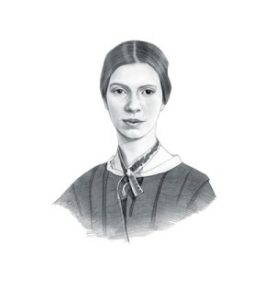
Rouge et Noir
Soul, wilt thou toss again?
By just such a hazard
Hundreds have lost, indeed,
But tens have won an all.
Angels’ breathless ballot
Lingers to record thee;
Imps in eager caucus
Raffle for my soul.
Emily Dickinson
(1830—1886)
Rouge et Noir
• fleursdumal.nl magazine
More in: Archive C-D, Archive C-D, Dickinson, Emily
Feeling All the Kills is a dazzling new collection that breaks the poet’s silence on what it means to experience and live in the wake of a violent assault and rape.
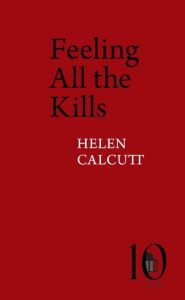 Calcutt weaves stunning musicality with raw, unhindered storytelling, as the poems both collectively, and in their individual power, explore the distinctly connected, yet fractured selves of ‘sexual being’, ‘mother’ and ‘abused person’.
Calcutt weaves stunning musicality with raw, unhindered storytelling, as the poems both collectively, and in their individual power, explore the distinctly connected, yet fractured selves of ‘sexual being’, ‘mother’ and ‘abused person’.
Through the poems’ breathtaking and vital vocabulary Calcutt brings the physical, emotional, and sexual nuances of life to the foreground, with strength, subtlety and beauty, and courageously harnesses a sense of ownership over such a lasting trauma.
At the heart of this collection is a personal desire to navigate a way back to a sensual, whole-feeling self, to shamelessly ‘feel all’ — with authenticity and power.
Helen Calcutt is a leading artist and choreographer working with a specialism in text embodiment within theatre & movement. She is the author of three volumes of poetry and Artistic Director of dance-theatre company ‘Beyond Words‘.
Her writing has been published globally. ‘Somehow’ (Verve Poetry Press, 2020), was a PBS Winter Bulletin Pamphlet & Poetry School Book of the Year (2020). Anthology ‘Eighty-Four’ (Verve Press, 2019), created in aid of the suicide prevention charity C.A.L.M. was a Saboteur Award shortlist & a Poetry Wales Book of the Year, 2019. Her full-length collection ‘Feeling All the Kills’ was published by Pavilion Poetry, April 2024.
Feeling All the Kills
by Helen Calcutt (Author)
Pavilion Poetry
Publisher: Liverpool University Press
28 April 2024
Language : English
Paperback : 84 pages
ISBN-10 : 1802074724
ISBN-13 : 978-1802074727
£10.11
•fleursdumal.nl magazine
More in: #Modern Poetry Archive, - Book News, - Bookstores, Archive C-D, Archive C-D
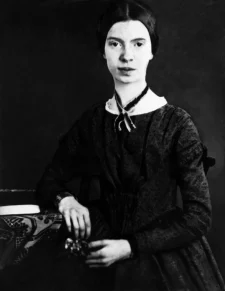
Wild nights
– Wild nights!
Wild nights – Wild nights!
Were I with thee
Wild nights should be
Our luxury!
Futile – the winds –
To a Heart in port –
Done with the Compass –
Done with the Chart!
Rowing in Eden –
Ah – the Sea!
Might I but moor – tonight –
In thee!
Emily Dickinson
(1830—1886)
Wild nights – Wild nights!
• fleursdumal.nl magazine
More in: Archive C-D, Archive C-D, Dickinson, Emily

I’m Nobody!
Who are you?
I’m Nobody! Who are you?
Are you – Nobody – too?
Then there’s a pair of us!
Dont tell! they’d banish us – you know!
How dreary – to be – Somebody!
How public – like a Frog –
To tell your name – the livelong June –
To an admiring Bog!
Emily Dickinson
(1830—1886)
I’m Nobody! Who are you?
• fleursdumal.nl magazine
More in: Archive C-D, Archive C-D, Dickinson, Emily

My Life had stood
– a Loaded Gun
My Life had stood – a Loaded Gun –
In Corners – till a Day
The Owner passed – identified –
And carried Me away –
And now We roam in Sovreign Woods –
And now We hunt the Doe –
And every time I speak for Him
The Mountains straight reply –
And do I smile, such cordial light
Opon the Valley glow –
It is as a Vesuvian face
Had let it’s pleasure through –
And when at Night – Our good Day done –
I guard My Master’s Head –
’Tis better than the Eider Duck’s
Deep Pillow – to have shared –
To foe of His – I’m deadly foe –
None stir the second time –
On whom I lay a Yellow Eye –
Or an emphatic Thumb –
Though I than He – may longer live
He longer must – than I –
For I have but the power to kill,
Without – the power to die –
Emily Dickinson
(1830—1886)
My Life had stood – a Loaded Gun
• fleursdumal.nl magazine
More in: Archive C-D, Archive C-D, Dickinson, Emily
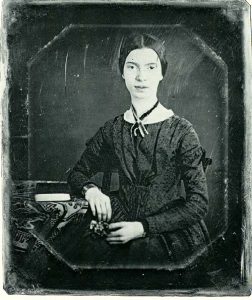
Because I could not stop
for Death
Because I could not stop for Death –
He kindly stopped for me –
The Carriage held but just Ourselves –
And Immortality.
We slowly drove – He knew no haste
And I had put away
My labor and my leisure too,
For His Civility –
We passed the School, where Children strove
At Recess – in the Ring –
We passed the Fields of Gazing Grain –
We passed the Setting Sun –
Or rather – He passed Us –
The Dews drew quivering and Chill –
For only Gossamer, my Gown –
My Tippet – only Tulle –
We paused before a House that seemed
A Swelling of the Ground –
The Roof was scarcely visible –
The Cornice – in the Ground –
Since then – ’tis Centuries – and yet
Feels shorter than the Day
I first surmised the Horses’ Heads
Were toward Eternity –
Emily Dickinson
(1830—1886)
Because I could not stop for Death
• fleursdumal.nl magazine
More in: Archive C-D, Archive C-D, Dickinson, Emily

Song for the New Year
Old Time has turned another page
Of eternity and truth;
He reads with a warning voice to age,
And whispers a lesson to youth.
A year has fled o’er heart and head
Since last the yule log burnt;
And we have a task to closely ask,
What the bosom and brain have learnt?
Oh! let us hope that our sands have run
With wisdom’s precious grains;
Oh! may we find that our hands have done
Some work of glorious pains.
Then a welcome and cheer to the merry new year,
While the holly gleams above us;
With a pardon for the foes who hate,
And a prayer for those who love us.
We may have seen some loved ones pass
To the land of hallow’d rest;
We may miss the glow of an honest brow
And the warmth of a friendly breast:
But if we nursed them while on earth,
With hearts all true and kind,
Will their spirits blame the sinless mirth
Of those true hearts left behind?
No, no! it were not well or wise
To mourn with endless pain;
There’s a better world beyond the skies,
Where the good shall meet again.
Then a welcome and cheer to the merry new year,
While the holly gleams above us;
With a pardon for the foes who hate,
And a prayer for those who love us.
Have our days rolled on serenely free
From sorrow’s dim alloy?
Do we still possess the gifts that bless
And fill our souls with joy?
Are the creatures dear still clinging near?
Do we hear loved voices come?
Do we gaze on eyes whose glances shed
A halo round our home?
Oh, if we do, let thanks be pour’d
To Him who hath spared and given,
And forget not o’er the festive board
The mercies held from heaven.
Then a welcome and cheer to the merry new year,
While the holly gleams above us;
With a pardon for the foes who hate,
And a prayer for those who love us.
Eliza Cook
(1818 – 1889)
Song for the New Year
•fleursdumal.nl magazine
January 01, 2025
More in: # Classic Poetry Archive, Archive C-D, Archive C-D
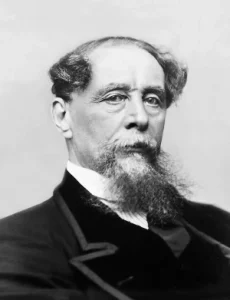
The Song of the Wreck
The wind blew high, the waters raved,
A ship drove on the land,
A hundred human creatures saved
Kneel’d down upon the sand.
Three-score were drown’d, three-score were thrown
Upon the black rocks wild,
And thus among them, left alone,
They found one helpless child.
A seaman rough, to shipwreck bred,
Stood out from all the rest,
And gently laid the lonely head
Upon his honest breast.
And travelling o’er the desert wide
It was a solemn joy,
To see them, ever side by side,
The sailor and the boy.
In famine, sickness, hunger, thirst,
The two were still but one,
Until the strong man droop’d the first
And felt his labours done.
Then to a trusty friend he spake,
“Across the desert wide,
O take this poor boy for my sake!”
And kiss’d the child and died.
Toiling along in weary plight
Through heavy jungle, mire,
These two came later every night
To warm them at the fire.
Until the captain said one day,
“O seaman good and kind,
To save thyself now come away,
And leave the boy behind!”
The child was slumbering near the blaze:
“O captain, let him rest
Until it sinks, when God’s own ways
Shall teach us what is best!”
They watch’d the whiten’d ashy heap,
They touch’d the child in vain;
They did not leave him there asleep,
He never woke again.
Charles Dickens
(1812-1870)
The Song of the Wreck
• fleursdumal.nl magazine
More in: Archive C-D, Archive C-D, Charles Dickens, Dickens, Charles
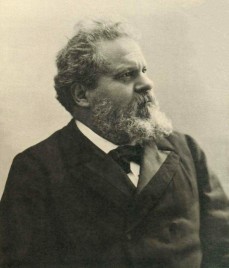
Dante
Strong forms were those of the New Life, that stood
Around thy cradle,
O Master of the song that looks above!
A brave young giantess,
Unknown before to Greek or Latin shores,
Daring in love and hate, and fair withal,
Came Tuscan Libertade, and the child
Already with bounteous breast did comfort thee.
And all a-glowing with her spheral rays,
Mild and austere in one,
Came Faith: and she, across a shore
Obscure with crowds of visions and of shades,
Opened for thee the Gate of the Infinite.
Sighing and pensive, yet with locks aglow
With rosy splendour from another air,
Love made long stay.
And such the gentle things
He talked to thee with bashful lips, so sweetly
He entered all the chambers of thy heart,
That no one ever knew to love like thee.
But soon away from lonely meditating,
O youthful recluse,
Wild clamour and fierce tumult tore thee, and
The fury of brothers seeking brothers’ blood.
Thou heard’st the hissing flames of civil war
On neighbour’s walls; thou heardest women shriek
To heaven that altars and the marriage bed,
The dear hearth-stone and the infant’s cradle,—
All that made fair the marital abode,
Were swept away in one great gulf of flame.
Their men had rushed from their embrace to arms;
The youth breathed only anger and destruction.
Thou sawest the raging of swords
Seeking the breast-plunge;
Thou heardest the dying warrior
Blaspheme and curse:
Before thee, streaming with gore,
Gold locks and grey;
And the Furies offering
To Liberty the execrated host
Of human victims;
And Death, the cruel arbiter of fates,
Crumbling the mighty towers and opening
The long-barred gates.
Amid wild scenes
So grew thy Italian soul,
And prayed that the long civil hate might end.
Meanwhile he saw
Of love such pure revealings and so strange,
The which depicted in the shade
Of a young myrtle-tree,
Each one who saw must bow the head in reverence.
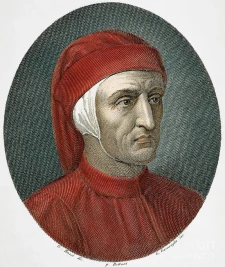
But o’er this gentle dream
There came the voice of weeping,
Bitterly sounding from the maternal source.
Alas! broken by the whirlwind,
Lies the fair myrtle,
And with wide-spread wings
The dove of sweet affection is flown forth
To seek a purer aura for its flight.
He, driven here and there
In the thick darkness of the turbulent age,
Sought refuge with the famous shades of old;
So learned to hate himself and present things.
And in the twilight came he forth a giant,
Seeming a shade himself—an angry shade
Who through the desert went from tomb to tomb,
Now questioning and now embracing them:
Until before him rose across the ruin
And dust of these barbaric ages gone,
Like a cloudy pillar, the ancient Latin valour.
Then all that such a ruin tells did burst
Upon the silent air in one great cry.
In the exalted vision
Arose the poet divine; and now, disdaining
His stricken land and time that only wasted
In petty aimless strife the ancient strength,
He, in the seeing of his heart’s desire,
Saluted thee, O modern Italy,—
One, in thy valiant arms, thy laws, thy speech.
And then, to truly tell
What such a vision meant, he sought to know
The life that rolls through all the sea of being.
From beneath the dust of buried centuries
He made things good and ill to tell their tale
Through him the fatal prophet: till his voice
Resounded through the world, and made the ages
Turn and behold themselves. Judge and lord,
He placed them where they could themselves behold,
Admired and wept, disdained and laughed at them;
Then shut them up in his eternal song,
Well pleased that he had power to do this much.
And meanwhile this poor tangle
Where the weeping and the wailing still goes on,
This endless fraud and shadow
Which has the name of life and is so base,—
All this didst thou despise! Thy sacred muse
Explored the depths of all the universe.
Following the good gentile Philosopher
Who placed thee in the midst of secret things,
Thou didst desire to see as angels see
There where there is no intervening veil;
And thou wouldst love as they do love in heaven.
Up through the ways of love
The humble creature
Pushing his way to the Creator’s presence,
Wished to find rest in that eternal Truth
Which taught thee the great love and the great thought.
Here Virgil failed thee,
And thou, deserted,
A lonely human spirit as if drowned
Within the abyss of thy immense desire,
Didst vanish overwhelmed in doubt,—
When as on wings
Angelical there came unto thy grief
She who is love and light and vision
Between the understanding and the True.
No mortal tongue like mine may give her name,
But thou who lovedst didst call her Beatrice.
And so from sphere to sphere
‘T was naught but melody that thou didst hear,
‘T was naught but one great light that thou didst see,
And every single sense thou hadst was love,
And verse and spirit made one harmony
Like unto her who there revealed herself.
Alas! what caredst thou then
For thy poor country and the endless strife
That rent its cities like, alas! even those
That make forever dark the vales of hell!
From heaven descending thou didst thrice bring down
The Hymn Supreme, and all the while there shone
Upon thy brow a radiance divine
Like his who spake with God in Sinai.
Before thee shining
In all the splendour of the holy Kingdom
Flashed in its crimson light the mortal field
Of Montaperto, and along the wastes
Deserted and malignant came the sound,
Dreary and dull, of dying warriors’ sighs:
To which far off responded
With a great cry of mingled human woe
The cursed battle-field of Campaldino.
And thou, Rea Meloria,
Didst rise from the Tuscan sea
To tell the glory of this horrid slaughter,
And of the Thyrrenian shores made desolate
With this our madness, and the sea’s great bosom
All stained with blood, and far Liguria’s strand
Filled with the moan of lonely Pisan exiles
And children born for fratricidal war.
Giosuè Carducci
(1835 – 1907)
Dante
• fleursdumal.nl magazine
More in: # Classic Poetry Archive, Archive C-D, Archive C-D, Dante Alighieri

Petrarca
If far from turbid thoughts and gloomy mood
Some smiling day should see my wish fulfilled
Where breathe the vales with gentle brooks enrilled
The soft air of my Tuscan neighbourhood,
There, where is heard no more the garrulous brood
Of thoughtless minds, in deep oblivion stilled,
Would I to thee my heart’s pure altar build
In the green blackness of the tangled wood.

There with the dying splendours of the sun
Thy song should glow amid the flowers springing
On breezy banks where whispering streams do run;
As if, still sweeter sounds and odours flinging
Upward to heaven when the day is done,
A nightingale from bough to bough were singing.
Giosuè Carducci
(1835 – 1907)
Petrarca
• fleursdumal.nl magazine
More in: # Classic Poetry Archive, Archive C-D, Archive C-D, Archive O-P, Petrarca, Francesco

Madrigal
Breaking his way through the white clouds in the azure,
The sun laughs out and cries:
“O Springtime, come!”
Across the greening hills with placid murmurs
The streams sing back to the breeze:
“O Springtime, come!”
“O Springtime, come!” to his heart the poet is saying,
While gazing, O pure Lalage, in thine eyes!
Giosuè Carducci
(1835 – 1907)
Madrigal
• fleursdumal.nl magazine
More in: # Classic Poetry Archive, 4SEASONS#Spring, Archive C-D, Archive C-D
Thank you for reading Fleurs du Mal - magazine for art & literature